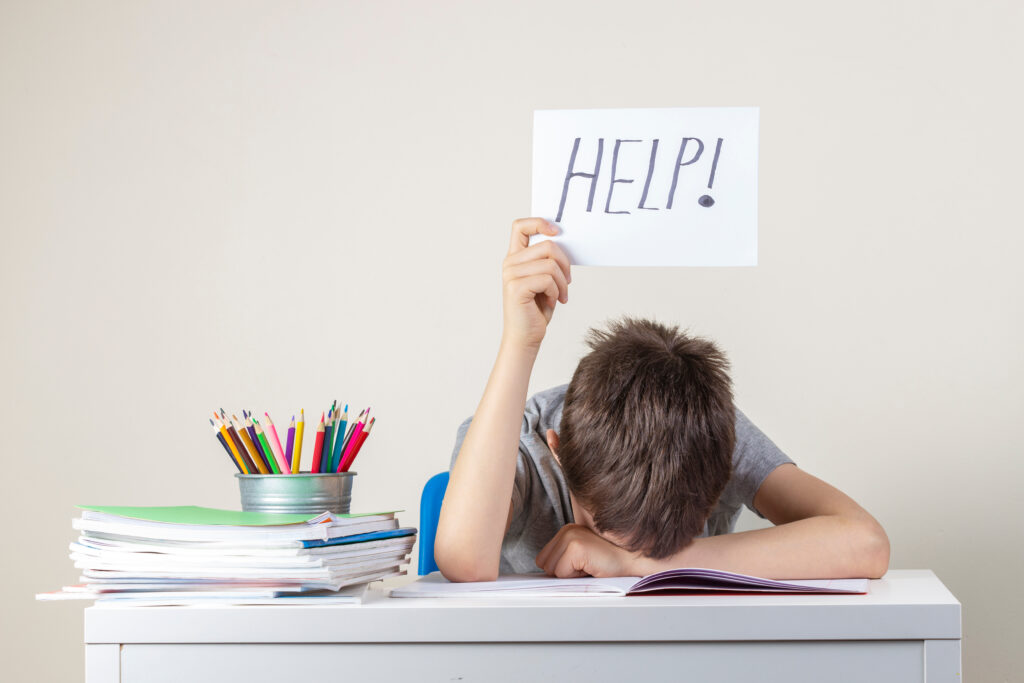
Stress at school arises for a variety of reasons. While many students often feel pressured by performance stress, others struggle with stress from bullying. Regardless of the cause, however, school stress is very stressful. If the high stress levels persist for a long time, physical and mental symptoms such as headaches, gastrointestinal problems, anxiety and nervousness can develop.
Only when the stressors are identified can school stress be managed. Does your child often have stress at school? With our tips, you can help your offspring overcome difficulties and learn again without stress.
The official school stress definition states that it is stress related to school. However, school stress is distinguished between two types of stress - positive and negative stress. In the positive sense, stress is a rush of adrenaline that enables special performance. This type of stress occurs in situations that we perceive as exciting challenges. In school, for example, these are presentations given in front of the entire class or exams for which one has prepared well.
In most cases, however, school stress is negative stress. School stress often occurs when schoolchildren feel either underchallenged or overwhelmed feel bullied or have learning difficulties. A special form of school stress is performance stress. This arises when children have too high expectations of themselves or want to meet the demanding expectations of their parents.
Fear of poor grades and the resulting feared reactions from teachers, parents or classmates can also contribute to performance stress. Children are often afraid of being considered "less intelligent" if they perform poorly. In our modern age, children start to feel the pressure to perform as early as preschool and elementary school age.
School stress is always social stress at the same time, because insufficient grades can lead to exclusion. Children often experience their school environment as hostile. Those who are made outsiders and cannot assert themselves against aggressive classmates perceive the stress at school as something very burdensome. Another stress factor with negative effects on physical-psychological health is a non-functioning student-teacher relationship.

Stress at school can have many different causes. What can you do if your children are overwhelmed at school? Have you already asked yourself this question because your children have already experienced stress? In Germany, around a quarter of all elementary school students are said to already suffer from stress related to school attendance. The most common causes of school stress are:
Not every child finds learning at school stressful. Why do some children suffer from school stress, while others find everyday school life exciting, interesting or inspiring? Whether we experience stress or not depends on various factors. Our ability to cope with stressful situations plays an essential role.
Has your child learned to cope with stress? Nowadays, the pressure to perform at school and university is enormous. A good school leaving certificate is considered the most important prerequisite for starting a course of study or finding an apprenticeship. Often the Parents their child additional pressure by expecting excellent grades.
Behind this is usually the desire that the offspring should "have it better" later on and accomplish goalsthat father and mother were denied. Avoid making too many demands on your child, because these can trigger or intensify school stress.
When it comes to the causes of school stress, a distinction is made between performance-related and social reasons. Performance-related triggers of school stress include:
Social problems that can lead to school stress include:
How does stress at school affect a child? It is known that the Overload can cause symptoms in children on both the physical and emotional levels. The seven most common symptoms that indicate your child is overwhelmed are:
However, there is no typical symptom that undoubtedly indicates school stress. While some students react to too much stress in school primarily with psychological symptoms, they show School problems in others by physical complaints. Since anxiety, aggression, irritability, abdominal pain and dizziness also occur in connection with many diseases, a visit to the doctor makes sense so that organic causes can be ruled out.
Behavioral problems in children can be due to school stress, but also to problems at home. Observe your child if you suspect that he or she is withdrawing from his or her social environment, lying awake at night, or having nightmares. If school performance suddenly deteriorates, a discussion is the best way to find out the reasons and to be able to help your child.

If your child is showing overwhelmed symptoms that indicate school stress, he or she needs your loving support. Stress at school happens at every grade level. Even in elementary school, where there is plenty of free time to play after school, stressful situations can occur. In high school and senior years, most of the day is spent studying.
Most young people therefore know school stress from their own experience. It is important that your child learns early on that stress cannot be avoided and that he or she will have to deal with stressful situations later in life. Positive stress can even be productive and stimulating. However, excessive demands at school must not become a permanent condition.
What are the reasons that lead to school stress? Talk to your child and expose the stressors. The first step in reducing stress is to avoid the stressors. Excessive performance expectations can cause significant stress. In learning, every child has his or her own pace. Different talents, likes and dislikes of certain school subjects often lead to learning and homework being perceived as stressful.
In the process, the importance good grades should not be overestimated. Praise your child for their school performance, but avoid excessive criticism if the grades are not so positive. A schoolchild should never be criticized for a bad grade be punished. Much more important are encouragement and Motivation. Stress often arises before class tests and exams. This is quite normal in everyday school life. However, if school stress lasts for a longer period of time, it is recommended to promote stress reduction in order to avoid possible negative consequences.
Reducing school stress is important so your child can focus on homework again and enjoy going to school. With these eleven tips for relieving school stress, you can help your child relieve stress and get back on track. relax:
There is hardly ever a stress-free school. That's why it's important that children learn how to deal with stress at an early age. After sitting still for hours in class, students need a way to compensate. Make sure there is enough time to play and romp around. Meeting friends, playing sports, reading, doing handicrafts or listening to music help to relax and can reduce school stress.
A stable home environment, in which children can feel salvaged and feel safe is the best prevention of stress at school. Praise your child for good performance and thereby strengthen the child's self-confidence. Structure the daily routine so that unnecessary pressure and hectic are avoided. Plan time buffers so that your child can devote himself to homework and study in peace.
Relaxation exercises are among the proven anti-stress methods. Yoga, autogenous training and meditation are also suitable for children and easy to learn. With children's yoga, your child can switch off and relax. Sometimes a walk through nature with parents and siblings is enough to forget the stress of school. Good family relationships strengthen the sense of security and self-confidence of children.
Through praise and recognition, you show your child that he or she is valued and that you are always there to support them. While praise for good performance should be a given, consolation is also important if the classwork didn't turn out so well.
Children who suffer from school stress need the love and support of their parents. Show understanding and be proactive in supporting your offspring. It is important that children can talk about school problems at home. If negative feelings are suppressed, school stress builds up. As a result, stress symptoms become more severe.
You don't have to put pressure on your kids to perform. Inner motivation is much more important when it comes to dealing with school stress. Parents often expect peak performance and are too focused on their children's success. However, it is not possible for even adults to achieve peak performance on a sustained basis.
Is your child constantly stressed about school and you can't figure out the cause? If stress symptoms are affecting quality of life, professional help from a child psychologist or child psychiatrist may be necessary. The most common causes of school stress include learning disabilities as well as inefficient learning.
This is where learning coaching, which is based on a holistic approach and takes into account the individuality of each child, proves helpful. You can learn the method yourself by taking a Learning coach training do. Learning coach techniques are not the same as classic "tutoring". This concept is about addressing learning deficits and Learning Disabilities to recognize. A professional learning coach analyzes the underlying problem and suggests expert solution options.
In the case of children and adolescents who suffer from school stress due to their underachievement, professional counseling often includes the entire family. The main tasks of a learning coach are to identify learning deficits and learning disorders, to work out individual solution strategies, and to promote a sense of responsibility and independent work. In addition, the coach takes care of the practical implementation of modern learning theories.
Most of the time it succeeds with simple Tips against stress at school for relaxation to care. In order for your child to overcome school stress and learn efficiently, your loving support is the greatest help.

